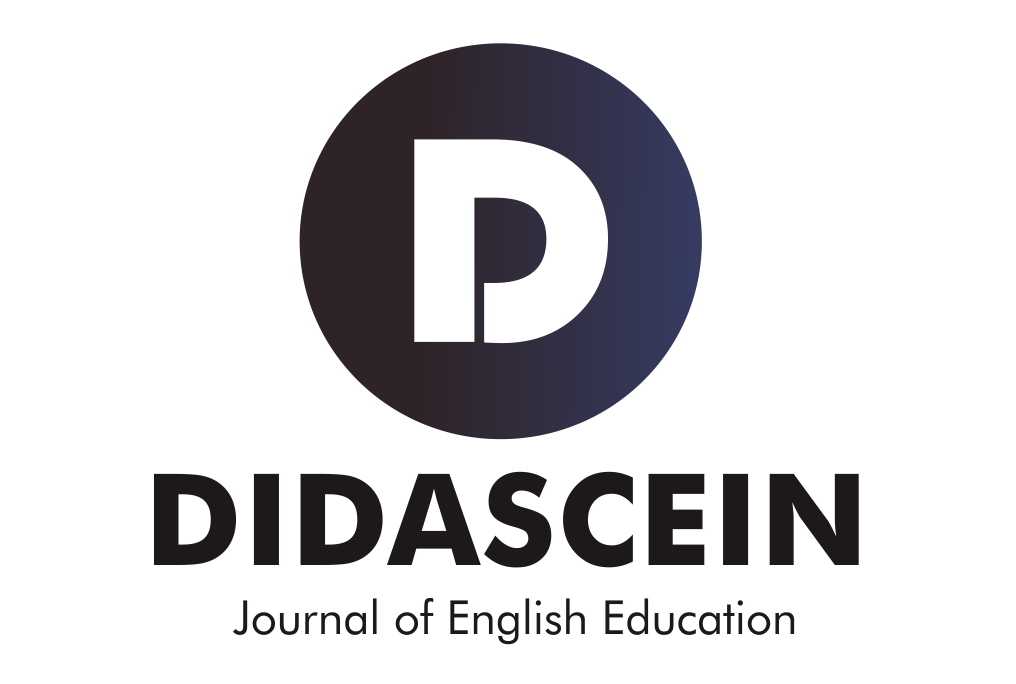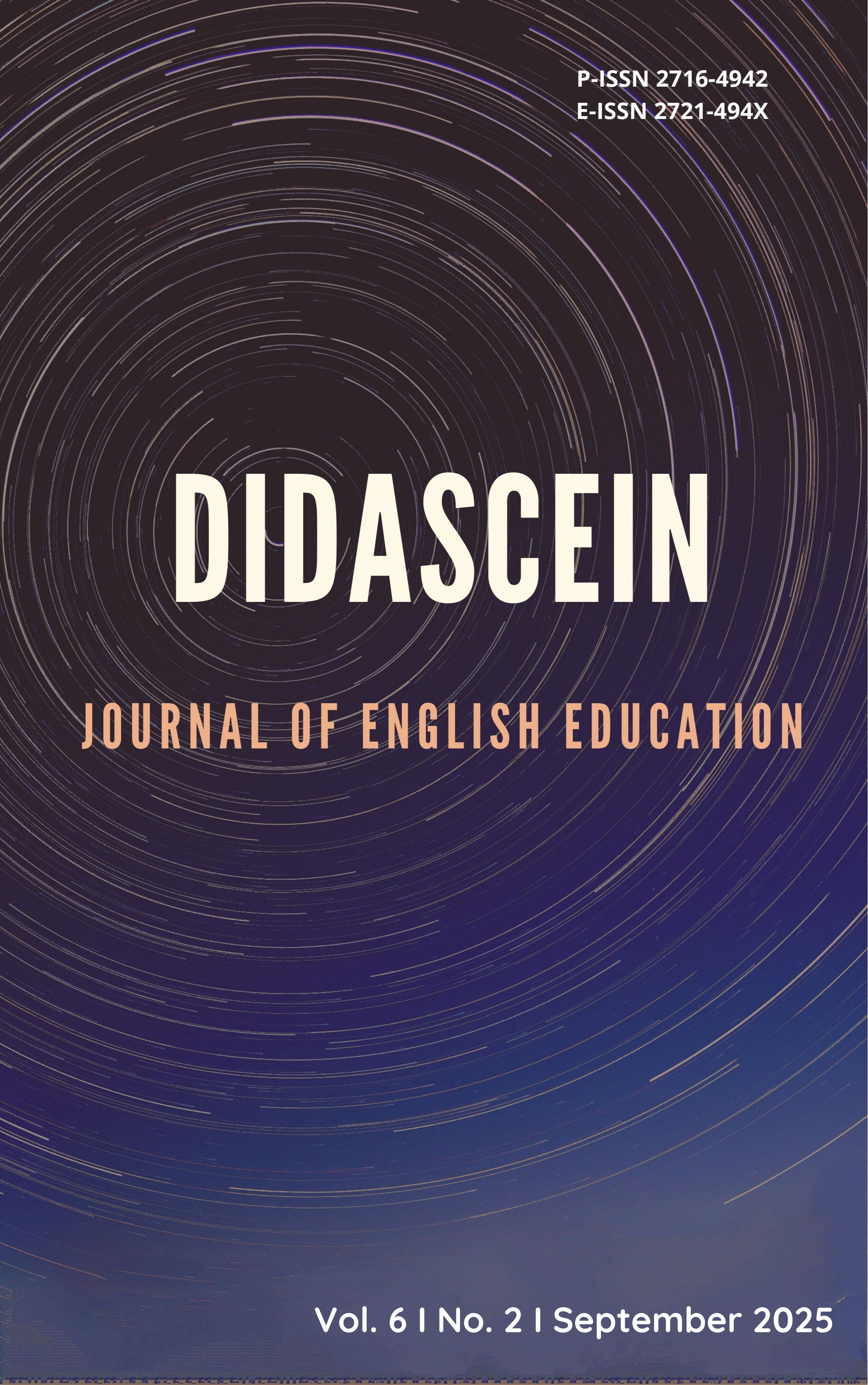THE THE RELATIONSHIP BETWEEN SELF-EFFICACY, MOTIVATION, AND SPEAKING ABILITY AMONG FOURTH SEMESTER STUDENTS
Keywords:
self-efficacy, speaking skills, motivationAbstract
This study aimed to address three objectives: the connection between self-efficacy and speaking skills, the link between motivation and speaking skills, and the simultaneous relationship among self-efficacy, motivation, and speaking skills. The researcher conducted a form of oral assessment to collect data on students' speaking skills. Meanwhile, to collect students’ self-efficacy and motivation, the researcher conducted questionnaires. Every student among the 38 samples was requested to deliver their presentation to the class. The obtained data were analyzed using correlational analysis run by SPSS. The results of the research revealed that there was a statistically significant relationship between self-efficacy and speaking ability (p < 0.05), as well as between motivation and speaking ability (p < 0.05). Furthermore, a significant overall relationship was found among self-efficacy, motivation, and speaking ability (F < 0.05). There was a notable relationship among self-efficacy, motivation, and speaking ability, with F < 0.05. The research findings indicated that both lecturers and students of the English Department at Kutai Kartanegara should focus more on efficacy and motivation. Additionally, the future researcher is encouraged to conduct a more in-depth observation involving a larger population and diverse research instruments in a related study or to implement teaching methods that boost students’ confidence and motivation in speaking classes.
References
Arlinda, F. (2022). The Correlation between EFL Students’ Self Efficacy in Speaking and Their Speaking Performance. RETAIN : Journal of Research in English Language Teaching, 10(01), 148–155. Retrieved from https://ejournal.unesa.ac.id/index.php/retain/article/view/46462
Ary, D. (1979). Introduction to Research in Education. United state of. America: Holt, Rinehart and Winston, Inc.
Astuti, Y. (2017). Achievement motivation, academic self-efficacy and the students’ speaking performance. Magister’s thesis.Universitas Negeri Malang.
Bandura, Albert. (1997). Self-efficacy - The Exercise of Control, New York: W.H. Freeman and Company.
Bandura, A. (2006). Guide for constructing self-efficacy scales. In F. Pajares & T. Urdan (Eds.). Self-efficacy beliefs of adolescents, (Vol. 5., pp. 307-337). Greenwich, CT: Information Age Publishing.
Cahyono, Bambang Yudi, & Rahayu, T. (2020). EFL Students’ Motivation in Writing, Writing Proficiency, and Gender. Teflin Journal, 31(2), 162–180. https://doi.org/10.15639/teflinjournal.v31i2/162-180
Cohen, L., Manion, L. & Morrison, K. (2000). Reserch methods in education (5th ed.). London: Routledge/Falmer
Dörnyei, Z. (2005). The Psychology of the Language Learner: Individual Differences in Second Language Acquisition. Lawrence Erlbaum Associates Publishers.
Gisella, I., Mulyadi, M. (2021). Exploring the influence of self-efficacy to undergraduate students' vocabulary mastery. Didascein: Journal of English Education, 2(2), 63-70.
Hairuzila, I., & Subarna, S. (2007). Perceived self-efficacy of ESL students with regard to their oral communication ability. Conference Proceeding. Paper presented at International Conference on Social Sciences and Humanities 2007, Bangi, Malaysia.
Hammer, J. (2001) The practice o English language teaching (3rd ed). Cambridge: Longman.
Harris, David P. 1974. Testing English as A Second Language. New York: Mc Graw-Hill Companies.
Harter, S. (1986). Cognitive-developmental processes in the integration of concepts about emotions and the self. Social Cognition, 4(2), 119–151. https://doi.org/10.1521/soco.1986.4.2.119
Hoesny MU, Setyosari P, Praherdhiono H, Suryati N (2023). The Correlation of Speaking Self-Efficacy, Speaking Proficiency and Gender in ESP Context. Pegem Journal of Education and Instruction, Vol. 13, No. 2, 2023, 191-199.
I Gde Putu Agus Pramerta. (2023). The Impact of Self-efficacy Towards Speaking Performance. Journal of Psychology and Instruction, 5(3). https://doi.org/10.23887/jpai.v5i3.65001
Jodai, Zafarghandi, & Tous. (2013). Motivation, Intergrativesness, Organizational Influence, Anxiety, and English Achievement. 3-4
Lang, J. W. B., & Fries, S. (2006). A revised 10-item version of the Achievement Motives Scale: Psychometric properties in German-speaking samples. European Journal of Psychological Assessment, 22, 216-224. doi: 10.1027/1015- 5759.22.3.216
Martín-Talavera, L., Gavín-Chocano, Ó., Sanz-Junoy, G., & Molero, D. (2023). Self-Concept and Self-Esteem, Determinants of Greater Life Satisfaction in Mountain and Climbing Technicians and Athletes. European journal of investigation in health, psychology and education, 13(7), 1188–1201. https://doi.org/10.3390/ejihpe13070088
Monte, C.F. & Lifrieri, F. R. (1973) The junior college self-actualizing, drive-reducing all-purpose motivational fulfillment machine: every ego has its price. Contemporary Education, XLV (1), 42-47.
Richards, J. C. and W. A. Renandya. (eds.). 2002. Methodology in Language Teaching: An Anthology of. Current Practice. Cambridge: Cambridge University.
Simanjuntak, S. I., & Tridinanti, G. (2020). Correlation between self-efficacy and writing achievement to students of SMA Arinda Palembang. Didascein: Journal of English Education, 1(1).
Ur, P. (1996). A Course in Language Teaching, Practice and Theory. Cambridge: Cambridge University Press.
Wiersma, William dan Stephen G. Jurs. 2009. Research Methods in Education: An Introduction. Boston: Allyn and Bacon.
Downloads
Published
How to Cite
Issue
Section
License
Copyright (c) 2025 Sakinah Hubaib

This work is licensed under a Creative Commons Attribution-NonCommercial-ShareAlike 4.0 International License.







